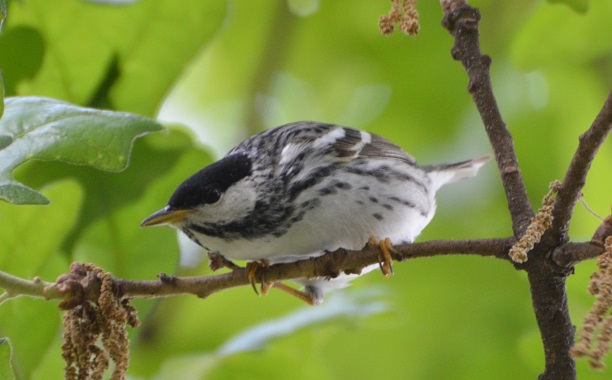A tiny songbird known as the blackpoll warbler, which weighs no more than a single AA battery, flies nonstop across the Atlantic Ocean in just two or three days, according to a recently published study.
The study, which was published on March 31 in the journal Biology Letters, confirms that the songbird flies nonstop across the Atlantic during its southerly fall migration — a migration which covers over 1,500 miles.
Despite their small stature, the black-and-white songbirds, which Live Science reports to be slightly larger than a hummingbird, perform what researchers behind the study have referred to as one of the most extraordinary migrations in the animal kingdom.
The little bird’s record nonstop flight as recorded by researchers was more than 1,700 miles over the course of three days.
Chris Rimmer, an ornithologist at the Vermont Center for Ecostudies and the study’s co-author, indicated that the only songbird with a longer nonstop flight is the northern wheatear.
In regards to the competition, Rimmer was quoted in a Live Science report as having said that “the blackpoll warbler is the hands-down winner” when you take body scale and size into account.
If you account for body scale and size, the blackpoll warbler is the hands-down winner […] I’m used to being amazed by birds because they do a lot of cool, extraordinary things, but it’s hard to top this one.
In order to track the birds, which scientists have long suspected of being incredible nonstop fliers, researchers attached solar geolocators to 38 blackpoll warblers which were captured near Vermont in Nova Scotia between May and August of 2013.
The tracking devices, which weighed just 0.5 grams, were retrieved in spring of 2014 when five of the birds — which are known formally as Setophaga striata — returned.
The Canadian birds were captured by scientists at the University of Guelph, located in Ontario, but Bill DeLuca, an environmental conservation research fellow at the University of Massachusetts, Amherst, led the U.S. side of the study.
The tiny birds travel south from New England and eastern Canada through Puerto Rico, Cuba and the Greater Antilles before reaching northern Venezuela and Colombia where they spend the winter in the rainforests.
On their return flight, the birds travel leisurely up the Atlantic Coast instead of opting for a more direct route.In order to make the long trek, the birds, which usually weigh about 12 grams, “fatten up” to roughly 16 grams before embarking on their long migratory journey, according to DeLuca who was quoted by New Scientist as having said the birds also absorb many of their digestive organs, turning them into flying machines composed of “just wings, fuel and a small orientation computer”.
It does fatten up, by almost doubling body weight and absorbing many of its digestive organs. It turns into a lean, mean flying machine, just wings, fuel and a small orientation computer
What are your thoughts on the 12-gram blackpoll warbler’s nonstop flight from New England to Colombia?
























